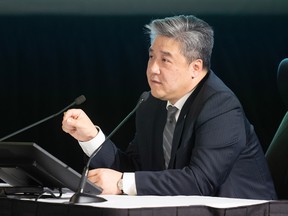[ad_1]
The Liberal Party rules state that people may vote in nomination contests if they are over the age of 14 and ‘ordinarily reside in Canada’

Article content
OTTAWA – Independent MP Han Dong said he was suddenly reminded by his wife days before his testimony at the Public Inquiry into Foreign Interference that a bus of international students, likely of Chinese descent, had voted in his nomination contest for Toronto’s Don Valley North riding in 2019.
Dong testified at the public inquiry on Tuesday. He sent a written submission to the inquiry the day prior, on April 1, six weeks after he was interviewed by the commission’s lawyers.
Advertisement 2
Article content
Article content
He said that he did not know “whether all those students voted for him but believes that it is likely most did” because he visited the school, which he identified as NOIC Academy (formerly known as the New Oriental International College), based in Markham, Ont., as part of his campaign.
Dong said he did not know who arranged or paid for the bus to transport students to his nomination contest, nor did he know if there was any co-ordination between his campaign team and the students.
He said he encouraged the students to support his candidacy by volunteering and registering as Liberal party members if they were eligible to do so, his submission to the inquiry reads.
“He believes that the students lived in a residence at Seneca College and recalls that they spoke Mandarin. As a result, he believes that they were likely mostly Chinese,” it said.
The national director of the Liberal Party of Canada, Azam Ishmael, said in an interview with commission lawyers that this activity was “compliant” with the party’s rules. People may vote in nomination contests if they are over the age of 14 and “ordinarily reside in Canada.”
Article content
Advertisement 3
Article content
He further explained that the “ordinarily reside in Canada” requirement is generally satisfied where the voter has proof of a Canadian address.
Recommended from Editorial
-

Canadian politicians’ trip to China at same time as foreign interference inquiry is ‘dumbfounding’
-

Parties weren’t warned of anticipated Chinese interference threats in 2021 election
Dong was elected for the Liberals in the 2019 election but stepped down from caucus last year after reports by Global News related that he was in direct discussions with Chinese diplomats. The story alleged he told the Chinese to delay the release of Michael Kovrig and Michael Spavor, who were held prisoner in China at the time, because it would help the Liberals.
Dong has denied the allegations and filed a lawsuit against Global News.
Former special rapporteur on foreign interference David Johnston disputed Global’s story in his report last year but noted that there were “irregularities” in Dong’s nomination process and “well-grounded suspicion” that the activities were tied to the People’s Republic of Canada’s consulate in Toronto, with whom Dong maintains relationships.
Advertisement 4
Article content
During the cross-examination at the public inquiry, Dong said he was not sure what “irregularities” Johnston was referring to, but said that he agrees with the assertion that he maintains relationships with the Chinese consulate.
More to come
National Post
calevesque@postmedia.com
Get more deep-dive National Post political coverage and analysis in your inbox with the Political Hack newsletter, where Ottawa bureau chief Stuart Thomson and political analyst Tasha Kheiriddin get at what’s really going on behind the scenes on Parliament Hill every Wednesday and Friday, exclusively for subscribers. Sign up here.
Our website is the place for the latest breaking news, exclusive scoops, longreads and provocative commentary. Please bookmark nationalpost.com and sign up for our newsletters here.
Article content










